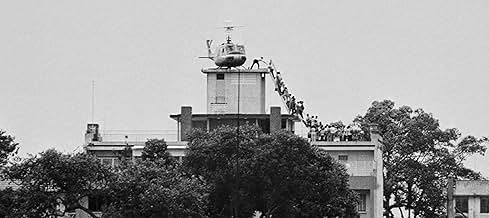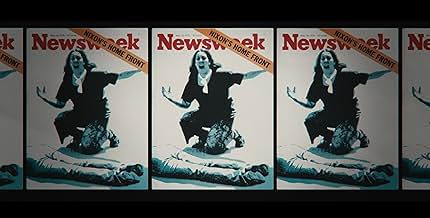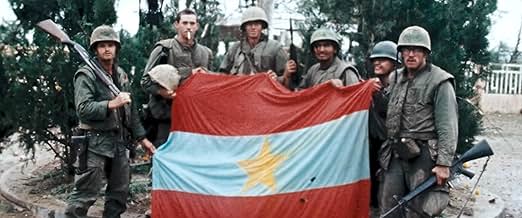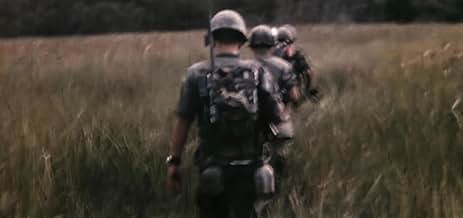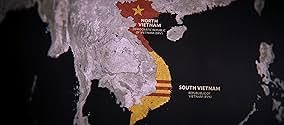Ponto de Virada: A Guerra do Vietnã
Título original: Turning Point: The Vietnam War
- Minissérie de televisão
- 2025
- 1 h 15 min
Os profundos efeitos da Guerra do Vietnã na identidade americana, causando divisões sociais e corroendo a confiança do governo. Mais do que uma derrota militar, transformou a política e a cu... Ler tudoOs profundos efeitos da Guerra do Vietnã na identidade americana, causando divisões sociais e corroendo a confiança do governo. Mais do que uma derrota militar, transformou a política e a cultura americanas.Os profundos efeitos da Guerra do Vietnã na identidade americana, causando divisões sociais e corroendo a confiança do governo. Mais do que uma derrota militar, transformou a política e a cultura americanas.
Explorar episódios
Avaliações em destaque
I really enjoy this kind of documentary, especially because its length - over five hours - allows it to take its time and properly explore a story from as many angles as possible.
What struck me most, personally, was that I ended up feeling sympathy and even a kind of sorrow for both sides. The filmmaker makes a real effort to stay as neutral as possible, showing the motivations - and especially the suffering - on both sides of the conflict.
One real eye-opener for me was what happened to the South Vietnamese who had worked with the Americans, after the US defeat and the communist takeover. It was shocking to see the consequences they faced. And what's more, the country is still divided in many ways because of this war - emotionally, politically, socially.
Neither side is painted as the bad guy.
What struck me most, personally, was that I ended up feeling sympathy and even a kind of sorrow for both sides. The filmmaker makes a real effort to stay as neutral as possible, showing the motivations - and especially the suffering - on both sides of the conflict.
One real eye-opener for me was what happened to the South Vietnamese who had worked with the Americans, after the US defeat and the communist takeover. It was shocking to see the consequences they faced. And what's more, the country is still divided in many ways because of this war - emotionally, politically, socially.
Neither side is painted as the bad guy.
There have been many excellent TV/streaming series on the Vietnam War and this is another. To be clear, the big events of the war, especially from the years 1965 to 1973 were amply addressed by the other series and the only thing different about this one is some of the interviewees are new.
Where the series adds something new is at the beginning and end of the conflict. The description of the early 20th century developments and the Kennedy years contained some material I don't remember from other series. Ditto for the period after the Paris Peace Treaty. For example, a representative of the Communists admitted they went too far in their postwar purge of the former South Vietnam. I don't remember the other series showing expressions of doubt or regret by the Communists. I think this speaker's regrets could be expressed more freely because relations between the US and Vietnam are so much better today.
Finally, I'm a little surprised that other reviewers suggest the series only shows the American perspective, the series interviews many Vietnamese from both sides of the conflict. While I think the series is perhaps it little more generous to some American critics of the war then they should have been, I don't get the criticism of Dan Rather's inclusion. He was covering the war throughout the entire period of heavy American involvement. He is certainly very critical of the effort in retrospect, but I suspect he was like Walter Cronkite and millions of other Americans in thinking it began as a noble cause.
Where the series adds something new is at the beginning and end of the conflict. The description of the early 20th century developments and the Kennedy years contained some material I don't remember from other series. Ditto for the period after the Paris Peace Treaty. For example, a representative of the Communists admitted they went too far in their postwar purge of the former South Vietnam. I don't remember the other series showing expressions of doubt or regret by the Communists. I think this speaker's regrets could be expressed more freely because relations between the US and Vietnam are so much better today.
Finally, I'm a little surprised that other reviewers suggest the series only shows the American perspective, the series interviews many Vietnamese from both sides of the conflict. While I think the series is perhaps it little more generous to some American critics of the war then they should have been, I don't get the criticism of Dan Rather's inclusion. He was covering the war throughout the entire period of heavy American involvement. He is certainly very critical of the effort in retrospect, but I suspect he was like Walter Cronkite and millions of other Americans in thinking it began as a noble cause.
Therefore the first question will be: is it worth to watch?
To make it short: Yes, today more than some years ago It is of course primarily from an US point of view, in spite of several Vietnamese interview partners.
Does it miss possibly important details as some critics here argue? Most likely as all major conflicts have deeper roots and more sideways as you have footage to make a documentary about, but IMHO the series provides such a plethora of footage that most of us will see something new and disturbing.
The Vietnam War, as many conflicts before and afterward are presented as an array of conflicting political and military decisions, when in the end they are just killing humans on both sides for no reason. 50 years from now we'll see a similar documentary about the Ukraine, if free speech is still possible.
To make it short: Yes, today more than some years ago It is of course primarily from an US point of view, in spite of several Vietnamese interview partners.
Does it miss possibly important details as some critics here argue? Most likely as all major conflicts have deeper roots and more sideways as you have footage to make a documentary about, but IMHO the series provides such a plethora of footage that most of us will see something new and disturbing.
The Vietnam War, as many conflicts before and afterward are presented as an array of conflicting political and military decisions, when in the end they are just killing humans on both sides for no reason. 50 years from now we'll see a similar documentary about the Ukraine, if free speech is still possible.
I enjoy learning about 20th century American history, and the Vietnam War is one of my favorite documentary topics. I was initially concerned that this documentary would be filled with anti-American bias, however, it was much more balanced than I expected. The burning of villages by American/ARVN forces was discussed in one episode, for example, but it was also acknowledged that the North Vietnamese did a lot more of that kind of destruction. In one episode, a Viet Cong woman explains why she hated the Americans but also notes that many North Vietnamese didn't really understand what communism entailed. On the other hand, you had one million living in the North flee to the South when the civil war truce occurred, suggesting that many people did understand what life under communism meant (somewhat reminiscent of the East Germans escaping to West Germany, or maybe those Koreans living in the North who relocated to the South). To me this suggests the North Vietnamese victory was a pyrrhic one because while North Vietnam won, the people still didn't have most of the freedoms some people in the West take for granted nor the power. Of course, no more foreign control or interference. But I wonder if their lives changed for the better. We do know a million people from the South escaped (boat people) four years later.
Some critics have said that this documentary is a little too biased for their tastes. But I, someone who gets annoyed when I hear bias, didn't think so. To be sure, there was one guy in Episode 5 who annoyed me because I think he was being dramatic for the camera. Nevertheless, everyone else spoke in a measured way with occasional sincere emotions. All facts to me, and interesting perspectives, too. Some critics also suggest some important details were left out. I think this is true to some extent. No mention of the death of Ho Chi Min in 1969, for instance. I don't think General Giap was mentioned either. Still, I think for a five episode series, and given it's aim, it was wonderfully edited and directed. I love learning new details about subjects I'm already familiar with and this documentary did not disappoint.
I think the first 20-30 minutes of Episode 1 left me a little unclear how this documentary would play out. However, after that it started to grab my interest. As to be expected, there's a lot of sadness, grief, strife, and so on, on both sides. But don't take that as gratuitous anti-Americanism. Rather, I think the director was focused on telling a story from all points of view and how the Vietnam War permanently changed America and the relationship the American people has with their government because of it.
Some critics have said that this documentary is a little too biased for their tastes. But I, someone who gets annoyed when I hear bias, didn't think so. To be sure, there was one guy in Episode 5 who annoyed me because I think he was being dramatic for the camera. Nevertheless, everyone else spoke in a measured way with occasional sincere emotions. All facts to me, and interesting perspectives, too. Some critics also suggest some important details were left out. I think this is true to some extent. No mention of the death of Ho Chi Min in 1969, for instance. I don't think General Giap was mentioned either. Still, I think for a five episode series, and given it's aim, it was wonderfully edited and directed. I love learning new details about subjects I'm already familiar with and this documentary did not disappoint.
I think the first 20-30 minutes of Episode 1 left me a little unclear how this documentary would play out. However, after that it started to grab my interest. As to be expected, there's a lot of sadness, grief, strife, and so on, on both sides. But don't take that as gratuitous anti-Americanism. Rather, I think the director was focused on telling a story from all points of view and how the Vietnam War permanently changed America and the relationship the American people has with their government because of it.
There have been several documented series covering the subject matter over the decades , but this one ( in my humble opinion ) is the most concise . It doesn't skirt around the truth and in particular the lies from both sides . And there were lots of falsehoods by both and successive administrations about what was being done " over there " . Episodes three and four encapsulated the worst of what was being carried out , both in Vietnam and in America in 1968 . I'm disappointed that the producers didn't critique the over promoted and utterly hopeless Westmorland in more detail , as he more or less brought the whole thing to its knees and cost the lives of thousands of American servicemen and woman , not to mention the millions of Vietnamese civilians who were brutalised on a daily basis . The delicious irony of including the biggest draft dodger in history , John Wayne , was not lost on me.
A series for the ages.
A series for the ages.
Você sabia?
- CuriosidadesAired on the 50th anniversary of the Fall of Saigon.
- ConexõesFollows Ponto de Virada: 11/9 e a Guerra contra o Terror (2021)
Principais escolhas
Faça login para avaliar e ver a lista de recomendações personalizadas
Detalhes
- Data de lançamento
- País de origem
- Idioma
- Também conhecido como
- Turning Point: The Vietnam War
- Empresa de produção
- Consulte mais créditos da empresa na IMDbPro
- Tempo de duração
- 1 h 15 min(75 min)
- Cor
Contribua para esta página
Sugerir uma alteração ou adicionar conteúdo ausente



